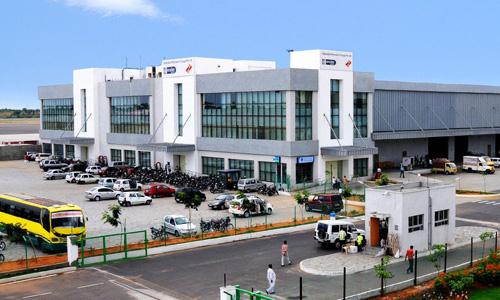Problems with infrastructure in India must be dealt with before the country can fully realize its Make in India vision, according to a variety of players in the Indian air cargo market who were speaking at the Air Cargo India 2016 conference.
“We have to recognize that the total supply chain in India connecting India to the world is not ready yet,” said Michael Steen, executive vice president and chief commercial officer of Atlas Air Worldwide. “There are small components that are ready, but there’s a lot of work that needs to be done to develop that supply chain so it can support the country domestically and internationally. The potential is fantastic. It’s huge and you can’t compare it with anywhere else in the world.”

One of the areas which needs to be improved, according to Air India, is airport facilities, particularly at airports other than in the six main metropolitan areas of Bangalore, Chennai, Delhi, Hyderabad, Kolkata and Mumbai.
“The other airports, where we have a lot of potential, don’t even have warehouses,” said D. Murali, executive director and cargo coordinator at Air India. “There are no X-ray facilities which are very important for the cargo to clear security requirements. So there are a lot of major infrastructure problems that we find and we’re not able to move cargo from these smaller airports and connect it to the major hubs.”
He added that there will be much more cargo movement if these regional airports are more well-developed.
But for Jassim Saif, vice president of cargo commercial operations at Emirates, even Mumbai’s airport is not sufficiently equipped to handle pharmaceuticals.
“You have the storage facilities here, but there are some elements missing,” said Saif. “One example is cool dollies between the warehouse and the aircraft.”
Given the size of the country and the entrepreneurial attitude of the people, India has far more potential than one would actually think, according to Alexis von Hoensbroech, member of the executive board at Lufthansa Cargo.
“When you think about unlocking this potential, for me, it boils down to three things – infrastructure, bureaucracy and digitization,” said von Hoensbroech. “With Make in India, we’re addressing exactly those issues, and I think that’s really what needs to be done.”
He said that to grow the country’s pharmaceutical industry, a working cool chain is “an absolute must.” This includes road infrastructure as well as airport facilities.
“Sometimes, when you look at Mumbai in the afternoon when all the air cargo is arriving, there’s a huge amount of congestion,” said von Hoensbroech. “The cargo stays for hours and hours on the lorries and doesn’t get to the warehouse.”
Another factor contributing to long dwell times is bureaucracy. Von Hoensbroech said that the paperwork process currently takes far too long and is a waste of time.
“In the end, speed is king,” he said. “If you don’t care about speed, you can take sea freight. If you take air freight, you have a reason, and this very reason is speed.”
In terms of digitization, von Hoensbroech said that India’s entrepreneurial spirit can really make a difference in reducing the number of physical documents that are involved.
“One shipment will sometimes have up to 30 to 35 different documents,” said von Hoensbroech. “Sometimes the document box is larger than the shipment itself – that’s ridiculous.”
One area where advancements can, and should, be made is technology.
“There’s nothing more expensive than not investing in IT,” said von Hoensbroech. “It’s one of the most important things that we need to do.”
He noted that what makes things so complicated is the fact that the industry consists of so many large players, all with their own systems.
“In the long run, we probably need a kind of data cloud, where the shipper puts in his set of data and everyone is able to update the data for that shipment,” he said. “You will gain speed, you will gain quality, and you will reduce costs. I think that is very straightforward but very difficult to achieve.”
Rainer Mueller, vice president of commercial at Saudia Cargo, was of the same opinion. “I think a common IT platform is so urgently needed,” he said. “What I don’t understand is how this industry and its leaders have not managed to do it in 30 years. On the passenger side, airlines started initiating this in the 1980s, and now the world is working with two or three common platforms.”
According to Mueller, it is up to the airlines themselves to make a move and to work on improving issues such as congestion and infrastructure, as well as air cargo as a whole.
“Why are we as the airlines accepting it?” he said. “Why aren’t we sitting down with our customers and saying, ‘This is not good – let us work on that’? This is something that we hold in our hands.”
By Jeffrey Lee
Asia Cargo News | Mumbai




